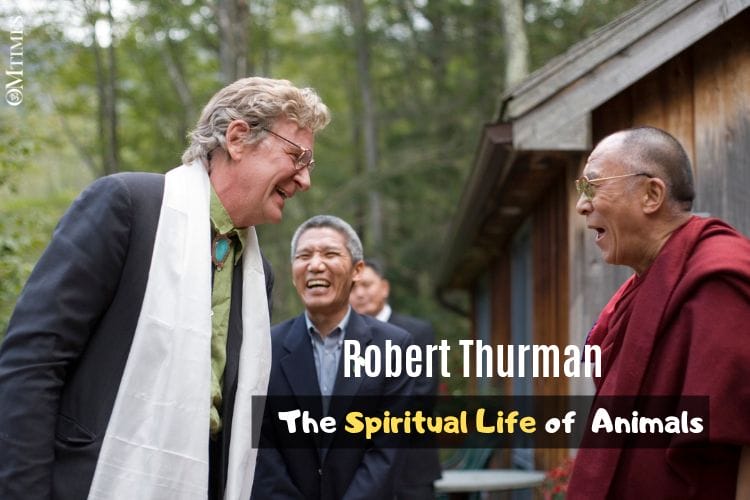Robert Thurman: Animal Spirituality

Robert Thurman is a recognized, worldwide authority on religion and spirituality. He’s Professor of Indo-Tibetan Buddhist Studies at Columbia University and President of the Tibet House, US, a non-profit organization dedicated to the preservation and promotion of Tibetan civilization. He’s written and edited and translated several books on Tibetan Buddhism and has been named one of Time Magazine’s 25 most influential Americans. In this interview, Robert Thurman discusses Tibetan perspectives on the soul, reincarnation, and the nature of human relationships with our animal companions.
An Interview with Robert Thurman – Animal Spirituality
Interview by Sandie Sedgbeer

Sandie Sedgbeer: Robert in January, 2017, millions of people sobbed their hearts out in movie theatres around the world as they watched a film based on W. Bruce Cameron’s best-selling book A Dog’s Purpose in which a devoted dog discovers his purpose in life by showing humans how to laugh and love over the course of several lifetimes spent with different owners. Reading some of the 1,980 overwhelmingly favorable reviews of the DVD on Amazon, I couldn’t help wondering what it was about that movie that resonated so profoundly with so many people – and pondering some of the broader questions it raises, such as ‘Do animals have an afterlife?’ ‘Do Dogs have souls and Purpose?’ ‘Are such souls the same as human souls, or are they different?’
Why do you think that movies of this nature elicit such huge outpourings of emotion within us? What is it that we’re all responding to? Is it sentimentality? Hope? Wishful thinking? Alternatively, something else?
Robert Thurman: I think there’s a mixture of the things you mentioned, but I also think the idea that people don’t believe in the continuation of the soul and the mind after death is over-sold. The view that human beings are nothing more than biological robots with no soul and no mind and, therefore, when their brain stops their existence ceases and they become nothing is not very logical, and not scientific because the question is: ‘Whoever discovered nothing?’ Nobody did, and nobody ever will, and everybody subliminally knows that even though officially, ‘we’re all modern so we’re going to be materialist people,’ when they get close to death themselves in the hospice people hedge their bets and call their Minister or their Rabbi or their Priest. So, the Tibetan and Hindu and Buddhist Daoist people and the ancient Christians before Constantine, the Jews, and many indigenous tribes, basically consider it’s more logical and sensible that the subtle energy and the super-subtle energy of the soul and the mind continue. So, the idea that everything is always a continuum, still in flux, is much more commonsensical than the idea that a living process at whatever level of subtlety can merely become nothing.
Since nothing is there, it’s not a place you can go. It’s not space. It has no room because it doesn’t exist. That’s the whole point. That’s why nobody ever discovered it and science, which is supposed to be based on empirical discovery, has not discovered anything and, therefore, they continue falsely assuring people that their mind and soul are nothing and people subliminally know that. That’s my view.
So, the biggest piece of unrealism is the idea that animals have no soul and they don’t have minds, that they’re not really living beings, they’re just walking food or enemies to be shot and hunted, or something. In the east, everyone knows that animals are on the spectrum with humans; that humans have been animals and animals have been humans in the past and will be human in other lives.
SANDIE SEDGBEER: You were interviewed for and subsequently wrote the Foreword to the book Soul Dog – A Journey into the Spiritual Life of Animals by Elena Mannes. In my experience, writing forewords is neither quick nor easy, particularly for someone who leads such a busy life as you. So, what was it about Elena’s book that impressed you enough to agree to write the foreword?
ROBERT THURMAN: Well, it’s not the kind of thing I usually write forewords for, or even read for that matter, although I agree with her sensitivity and sensibility. However, she had interviewed me for the book, and Indian and Tibetan Buddhists have this view that dogs are special and are emanations of the Buddha. Buddhists have this idea that these savior-type beings can manifest in other embodiments, not just in one, and so he [Buddha] manifests these embodiments or incarnations in the form of dogs because dogs make humans feel loved and secure. They love humans, they’re friendly, they wag their tail, so they see them as enlightened beings there to make human beings feel comfortable on earth and have a companion who’s loyal and faithful, and so on.
Anyway, I liked it, so I got involved with it. I don’t believe in materialism. I also don’t believe in a single model creator God either, but Buddhists do believe in gods. They’re non-monotheistic, but they think there are extraordinary beings in the world and they don’t consider them supernatural, they consider them natural, part of nature.
SANDIE SEDGBEER: Buddhists see all animals as sentient beings, but many religions, particularly western religions, argue that man was created superior to animals and thus animals cannot possibly be equal with him. Most interpreters of the Bible assume that man’s likeness to God, and animals’ subservience to man implies that they have the breath of life but not an immortal soul in the same sense as humans. How did this divide between east and western philosophy begin?
ROBERT THURMAN: Well, I’m not sure historically, but one thing that I would mention first is Albert Schweitzer who was a very pious Christian and a profound believer in Jesus. One aspect of Christian doctrine that he refused to accept was that animals have no souls and were just there to be cannon fodder and food for humans. He was very against that on principle. I never read in any of his works an analysis of a moment in history when westerners and the Christian church adopted that official doctrine. Indeed, Jesus never mentioned that animals didn’t have a soul, at least in the Gospels that we have.
The majority of people in the world do feel a kinship with animals. In the Buddhist sense, there is a little bit of anthropocentric world view. In the sense when a living being rises above the animal life form – and by above, I mean to a greater degree of independence, intelligence, ability to not react instinctively to things. To think things through and restrain instincts, and so on – moreover, that makes the human being more powerful than the animal and more gentle than predatory animals, though humans can be even more predatory than animals. Then there is a range above humans where you have what is called Titans and Divinities and things like that in the Buddhist world view. These are just life forms that people cycle through, and none of them are perfect. Then there are the gods, but the idea that one of them created everybody is not even. I mean, look, even in the Jewish Bible the snake talks and seduces or waylays Adam and Eve and gets them kicked out, then is condemned by God to have no legs and has to crawl on the ground, but before that he’s talking.
So, even in ancient times before various authorities formalized all these things, it would seem that humans were aware of the sentience of animals. It’s like a reasonable thing to be aware of that, and it doesn’t mean that they are necessarily equal to you in abilities or you can’t talk to them unless you have a unique psychic ability, but the point is they are sentient creatures.
Then Darwin, poor Darwin, is so belabored by canonic monotheists for showing the chain of connection between humans and monkeys, and some people are still freaking out about it in Arkansas in America, when they try to teach creationism in school, or teach Darwin, because it gets them to not believe in the bible. I mean, that is so silly. The Buddhists, long before Darwin, realized this connection with the animals, but they also have a spiritual connection because they’ve been animals. It isn’t just your genes; they’re the same genes as 98% of something in a chimpanzee. You were personally a chimpanzee, and that’s an even stronger sense of linkage to the natural world, and the different biological life forms than the Darwinian idea gives you through the materialism of genetic evolution.
I think at first it seems very weird to us in the west because we’re used to this idea that we have this spark of God, and we do, and God has the spark of humans. We also have the spark of chimpanzees, and we have the spark of crocodiles, and whatever.
However, one thing good about it is that it did help our scientists to escape from the church, the inquisition and the domination of their intelligence by some sort of ridiculous conformity that the church was imposing on people. However, they should overcome the dogma that there’s no subtle energy of the soul or the spirit. They have their long conversation about thermodynamic law that no energy is ever destroyed but can become dissipated in entropy, but it’s never destroyed. Somehow the mind is not energy? They won’t acknowledge the subtle energy of the mind even after the quantum discovery that there’s a plane of super-micro, sub-particle reality that you can’t reach into with course measurement and the uncertainty principle. Moreover, even after that they still are denying that the mind has the energy or is energy. That’s very irrational of them is all I can say.
Continue to Page 2 of the Interview with Robert Thurman
A veteran broadcaster, author, and media consultant, Sandie Sedgbeer brings her incisive interviewing style to a brand new series of radio programs, What Is Going OM on OMTimes Radio, showcasing the world’s leading thinkers, scientists, authors, educators and parenting experts whose ideas are at the cutting edge. A professional journalist who cut her teeth in the ultra-competitive world of British newspapers and magazines, Sandie has interviewed a wide range of personalities from authors, scientists, celebrities, spiritual teachers, and politicians.





